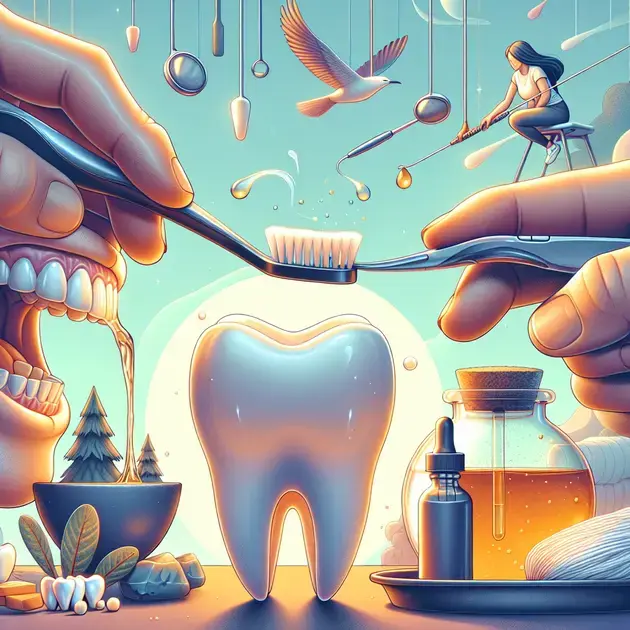When it comes to dental health, understanding the causes of tooth decay is crucial. Tooth decay, also known as cavities, affects people of all ages and can lead to serious oral health issues if left untreated.
Recent studies have shown that poor oral hygiene practices, consuming sugary foods and beverages, and not visiting the dentist regularly are common factors that contribute to the development of tooth decay. By gaining insight into these causes, individuals can take proactive measures to prevent the formation of holes in their teeth.

Understanding the Importance of Oral Hygiene
Oral hygiene plays a crucial role in maintaining overall health. It involves practices such as brushing teeth, flossing, and regular dental check-ups. An effective way to understand the importance of oral hygiene is by utilizing educational resources available online. One highly recommended website for comprehensive oral hygiene information is the American Dental Association (ADA) website. Here, you can find articles, videos, and tips on how to properly care for your teeth and gums.
Additionally, downloading apps like Colgate Connect can help you track your daily oral hygiene routine. This app provides personalized guidance on brushing techniques, flossing, and reminders for dental appointments. By following the tips and guidelines provided on these platforms, you can enhance your oral health and prevent various dental issues.
Another essential aspect of oral hygiene is understanding the impact of diet on oral health. Consuming sugary foods and drinks can contribute to tooth decay and gum disease. Therefore, making informed dietary choices is crucial for maintaining a healthy smile. Websites like MouthHealthy.org offer valuable insights into the relationship between diet and oral health, helping you make better food choices for your teeth.
By incorporating proper oral hygiene practices into your daily routine and staying educated on the subject, you can achieve optimal oral health and prevent dental problems in the future.
The Role of Diet in Tooth Decay
Diet plays a significant role in the development of tooth decay. Understanding the impact of various foods on dental health is essential for preventing cavities and maintaining strong teeth. To learn more about how diet affects tooth decay, websites like EatRight.org provide detailed information on nutrition and oral health. By following their guidelines and recommendations, you can create a dental-friendly diet that promotes healthy teeth and gums.
Tracking your dietary habits can also help you identify potential causes of tooth decay. Apps like MyFitnessPal allow you to log your meals and track your sugar intake, giving you valuable insights into your eating patterns. By monitoring your diet and making necessary adjustments, you can reduce the risk of developing cavities and other dental issues.
In addition to choosing the right foods, practicing good oral hygiene habits like brushing and flossing regularly is crucial for preventing tooth decay. Websites such as Delta Dental offer step-by-step guides on proper oral care routines, ensuring that you effectively remove plaque and bacteria from your teeth.
By maintaining a balanced diet, following recommended dietary guidelines, and practicing good oral hygiene, you can protect your teeth from decay and enjoy a healthy smile for years to come.
The Significance of Regular Dental Check-ups
Scheduling regular dental check-ups is vital for maintaining oral health and preventing dental problems. These appointments allow dentists to assess your overall oral health, detect any issues early on, and provide timely treatment. To understand the significance of regular dental check-ups, platforms like WebMD offer in-depth articles on the importance of preventive dental care.
Booking dental appointments can be made easier by using online services such as Zocdoc. This website allows you to search for dentists in your area, read patient reviews, and book appointments online. By utilizing these online tools, you can streamline the process of scheduling regular dental check-ups and stay on top of your oral health.
During dental visits, your dentist will perform a thorough examination of your teeth and gums, conduct cleanings, and address any concerns you may have. Websites like Colgate Professional provide detailed information on what to expect during a dental check-up, making it easier for you to prepare for your appointments.
By prioritizing regular dental check-ups and following the recommendations of dental professionals, you can ensure that your oral health is well-maintained and address any issues before they escalate.

Preventing Tooth Decay Through Proper Brushing Techniques
Proper brushing techniques are crucial in preventing tooth decay and maintaining good oral health. It is recommended to brush your teeth at least twice a day, using fluoride toothpaste. Start by placing your toothbrush at a 45-degree angle to your gums and gently move the brush back and forth in short strokes. Be sure to brush the outer surfaces, inner surfaces, and chewing surfaces of all teeth.
Another important aspect of proper brushing is the duration. Dentists recommend brushing for a minimum of two minutes each time. This ensures that all surfaces are adequately cleaned and helps to dislodge any food particles or plaque buildup. Pay special attention to hard-to-reach areas, such as the back molars and along the gumline.
Using the right toothbrush is also key in effective brushing techniques. Opt for a soft-bristled brush that is gentle on the gums and enamel. Replace your toothbrush every three to four months or sooner if the bristles become frayed. Additionally, consider incorporating mouthwash or antimicrobial rinses into your oral hygiene routine for added protection against tooth decay.
In addition to regular brushing, don’t forget to floss daily to remove plaque from between the teeth. This helps prevent cavities and gum disease by reaching areas that your toothbrush may not be able to access. Finally, schedule regular dental check-ups and cleanings to ensure that your oral health is on track and address any issues promptly.
The Connection Between Genetics and Dental Health
Genetics play a significant role in determining an individual’s susceptibility to dental issues such as cavities, gum disease, and enamel strength. Certain genetic variations can make some people more prone to tooth decay, regardless of their oral hygiene habits. Understanding one’s genetic predisposition can help tailor personalized dental care and preventive measures.
For example, studies have shown that genes can influence the composition of saliva, which plays a crucial role in protecting the teeth against harmful bacteria. Saliva helps neutralize acids, remineralize enamel, and wash away food particles. Individuals with genetic variations that result in reduced saliva production may be at a higher risk of tooth decay.
Furthermore, genetics can impact the structure of teeth and the susceptibility to enamel erosion. Some individuals may inherit weaker enamel, making their teeth more vulnerable to cavities and sensitivity. In such cases, proactive measures such as fluoride treatments or dental sealants can help strengthen and protect the teeth.
While genetics can influence dental health outcomes, it is essential to remember that proper oral hygiene practices and regular dental visits are still crucial in maintaining a healthy smile. By combining genetic insights with effective oral care routines, individuals can better manage their dental health and minimize the risk of common issues like cavities and gum disease.
Exploring Natural Remedies for Cavity Prevention
Natural remedies have long been used for cavity prevention and promoting overall oral health. While regular brushing and flossing are fundamental, incorporating natural ingredients can provide additional benefits for maintaining a healthy smile. Here are some natural remedies to consider:
Oil Pulling:
Oil pulling involves swishing a tablespoon of coconut, sesame, or sunflower oil in your mouth for about 15-20 minutes. This ancient practice helps remove bacteria, plaque, and toxins from the mouth, promoting oral hygiene and cavity prevention.
Tea Tree Oil:
Tea tree oil has antibacterial and anti-inflammatory properties that can aid in fighting off harmful bacteria in the mouth. Dilute a few drops of tea tree oil in water and use it as a mouthwash to reduce plaque buildup and support gum health.
Xylitol:
Xylitol is a natural sweetener that can help inhibit the growth of bacteria that cause cavities. Chewing xylitol gum or consuming xylitol mints can stimulate saliva production and create an unwelcome environment for cavity-causing bacteria.
Clove Oil:
Clove oil is known for its analgesic and antibacterial properties, making it a popular natural remedy for toothaches and cavities. Apply a small amount of diluted clove oil to the affected tooth or gums to alleviate pain and reduce inflammation.
While natural remedies can complement traditional dental care, it is essential to consult with a dentist before incorporating new practices into your oral hygiene routine. By combining natural remedies with regular brushing, flossing, and professional cleanings, you can take proactive steps towards cavity prevention and maintaining optimal dental health.
Conclusion
Proper brushing techniques, including brushing at least twice a day with fluoride toothpaste and employing the right brush angle and duration, are crucial for preventing tooth decay and maintaining overall oral health. Emphasizing thorough cleaning of all tooth surfaces and regular replacement of toothbrushes, alongside incorporating mouthwash, can enhance protection against decay.
Understanding the genetic link to dental health highlights the importance of tailored care based on individual susceptibility. Genetic variations impacting saliva composition and enamel strength can increase the risk of decay, underscoring the need for proactive measures like fluoride treatments. Combining genetic insights with regular oral care routines is key to managing dental health effectively.
Exploring natural remedies like oil pulling, tea tree oil, xylitol, and clove oil can offer additional support for cavity prevention. These remedies, when used alongside traditional dental care practices, such as brushing, flossing, and professional cleanings, can contribute to a comprehensive approach towards optimal oral health. Remember to consult with a dentist before incorporating new practices to ensure a holistic and proactive dental care routine.